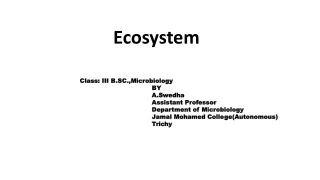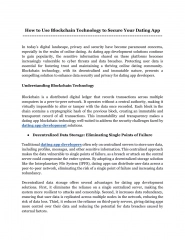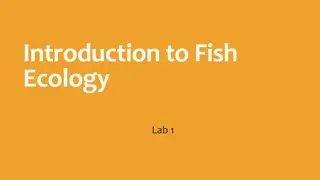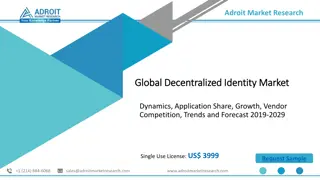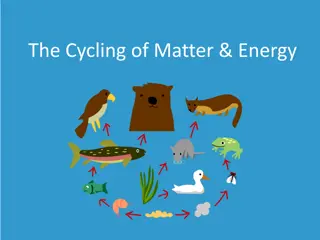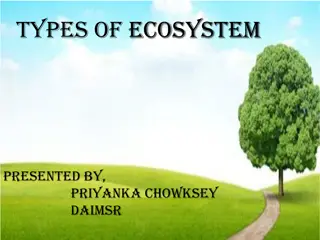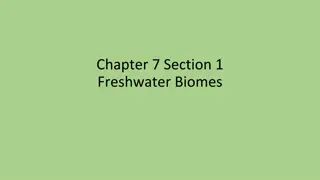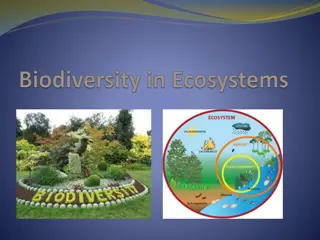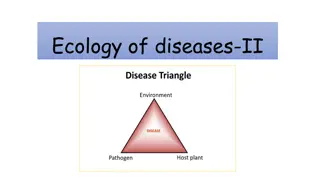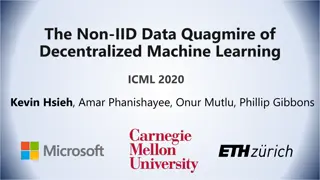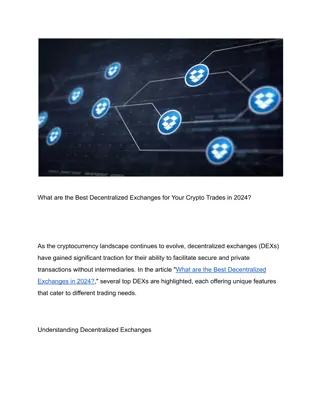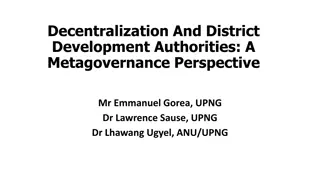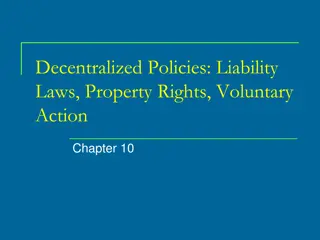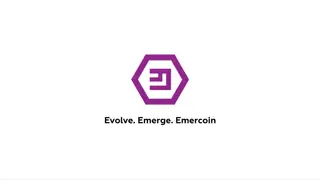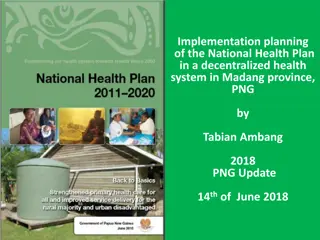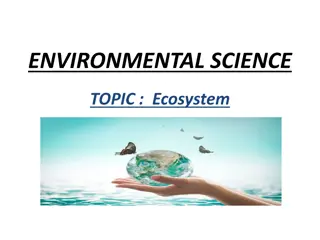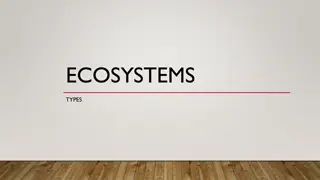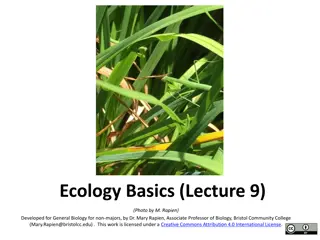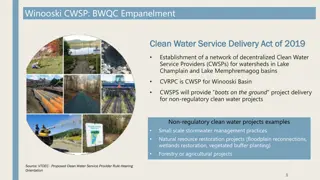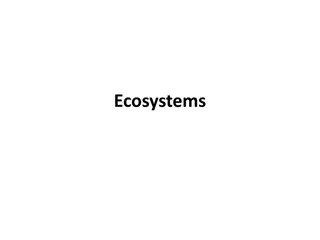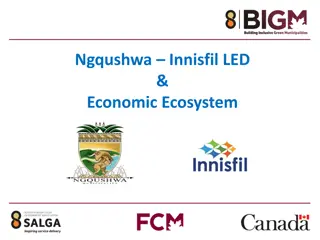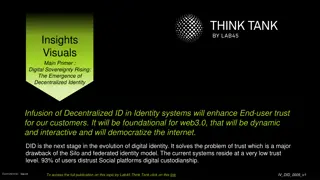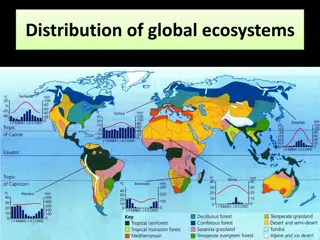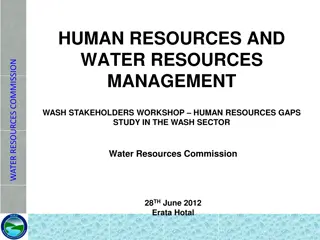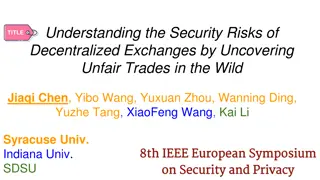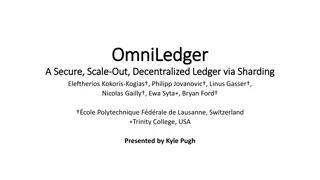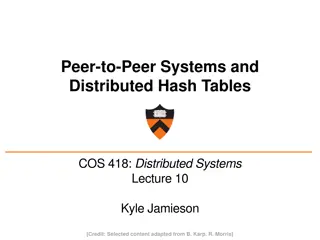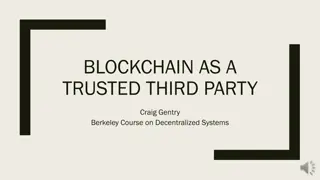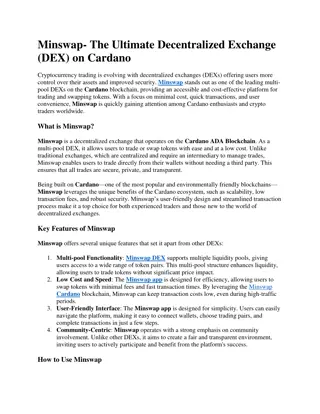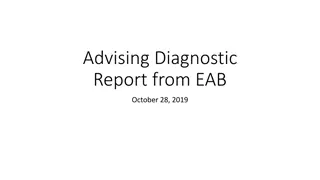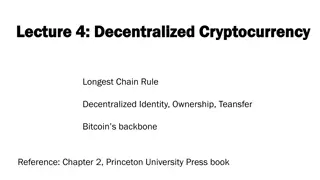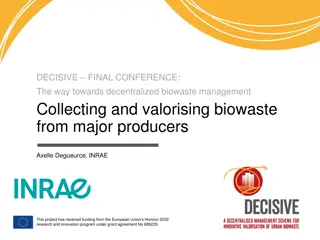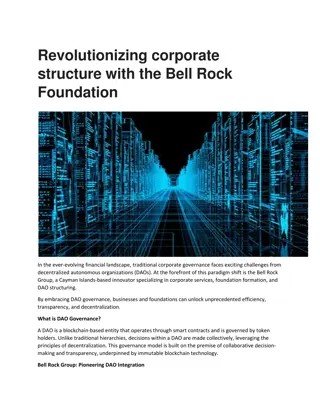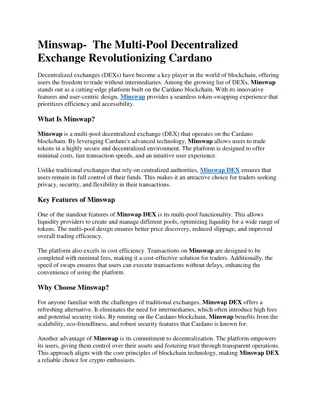Understanding Ecosystems: Types, Components, and Interactions
Different types of ecosystems, their components, and how they interact with each other. Explore natural ecosystems, such as deserts and rainforests, as well as artificial ecosystems. Discover the importance of terrestrial, aquatic, forest, marine, freshwater, tundra, and grassland ecosystems.
4 views • 6 slides
How to Use Blockchain Technology to Secure Your Dating App Data
Discover the transformative power of blockchain technology in securing data for dating app development solutions. Eliminate single points of failure with decentralized storage, boosting redundancy. Ensure immutable integrity, preventing unauthorized modifications to user data. Facilitate secure mess
1 views • 4 slides
Explore Market-Up: The Decentralized Marketplace on Blockchain Technology
Market-Up is a decentralized marketplace leveraging blockchain technology, smart contracts, and TRON cryptocurrency for voucher creation, sales, and payments. Users can participate in marketing programs, attract customers, and earn income securely and transparently. Activate your account to join thi
1 views • 16 slides
Understanding Fish Ecology: Interactions, Diversity, and Environmental Factors
Fish ecology involves studying the distribution, interactions, and abundance of fish species in different ecosystems. This lab delves into the divisions of ecology, fish species diversity in marine and freshwater ecosystems, and the environmental factors affecting fish diversity and abundance. Disco
1 views • 7 slides
Exploring Helium: A Decentralized IoT Network Revolution
Delve into the world of Helium, a blockchain-based IoT network revolutionizing connectivity. Managed by a community of crypto investors, this global network offers innovative solutions for telecom industry challenges through decentralized deployment and mining of HNT tokens.
0 views • 17 slides
Decentralized Identity Market size, share and forecast analysis 2019–2029
\nAdroit Market Research has included the Global Decentralized Identity Market\u00a0 research to its database in order to provide a thorough analysis of the variables driving a general market growth trend. The study contains a lot of information and is a useful tool for professionals in the field.
0 views • 5 slides
Interactions Among Species in Ecosystems
Understanding species interactions in ecosystems is vital for ecological balance. It involves concepts such as carrying capacity, niche occupancy, and symbiosis. Factors affecting a population's carrying capacity include resource availability, competition, predation, parasitism, and mutualism. Diffe
0 views • 21 slides
Understanding the Cycling of Matter and Energy in Ecosystems
Explore the interconnected web of life within biomes and ecosystems, where organisms play vital roles in maintaining balance. Learn about producers, consumers, and decomposers, and how energy flows through different trophic levels. Dive into the world of primary, secondary, and tertiary consumers, a
0 views • 24 slides
Exploring the Major Types of Ecosystems
Explore the diverse world of ecosystems, including grassland, aquatic, forest, and desert ecosystems. Learn about the biotic and abiotic factors that shape these environments and the critical roles they play in supporting life. Delve into forest ecosystems with their canopy, floor, and soil features
0 views • 29 slides
Exploring Freshwater Ecosystems: Lakes, Ponds, and More
Freshwater ecosystems offer a diverse range of habitats, from lakes and ponds to wetlands and rivers. These ecosystems host a variety of organisms adapted to different zones based on factors like sunlight and nutrients. Plankton, nekton, and benthos are key aquatic groups, with unique roles in the e
0 views • 24 slides
Importance of Biodiversity and Sustainability in Ecosystems
Biodiversity, the richness of life in genes, species, and ecosystems, plays a crucial role in sustaining the health of our planet and its inhabitants. It provides essential resources such as food, medicine, and economic benefits. Sustainability, the ability of ecosystems to maintain their structure
1 views • 6 slides
Understanding Ecosystems and Disease Ecology
Explore the diverse types of ecosystems, including autochthonous, anthropurgic, and synanthropic ecosystems, and their impact on disease ecology. Learn about biotopes, biocenosis, ecological mosaics, and ecological interfaces, and discover how infectious diseases can be transmitted across these inte
0 views • 10 slides
Tackling Skewed Data Challenges in Decentralized Machine Learning
Addressing the critical issue of skewed data in decentralized machine learning, this work explores solutions to effectively handle non-iid data distribution, focusing on communication bottlenecks, data skewness, and proposing innovative approaches for decentralized learning over skewed datasets.
0 views • 26 slides
What are the Best Decentralized Exchanges for Your Crypto Trades in 2024?
As the cryptocurrency landscape continues to evolve, decentralized exchanges (DEXs) have gained significant traction for their ability to facilitate secure and private transactions without intermediaries. In the article \"What are the Best Decentrali
0 views • 5 slides
Decentralization and District Development Authorities: A Metagovernance Perspective
The study explores the impact of District Development Authorities (DDAs) on Papua New Guinea's decentralized governance system. It focuses on metagovernance issues such as coordination, leadership, and conflict resolution within the decentralized framework. The introduction, approach, and analysis p
0 views • 14 slides
Decentralized Policies and Liability Laws in Environmental Protection
Explore the concept of decentralized policies in managing environmental pollution, focusing on liability laws, property rights, and voluntary actions. Discover how decentralized approaches offer advantages in addressing environmental externalities and how liability laws can change incentives for pol
1 views • 37 slides
Revolutionizing Communication with ENUMER: A Decentralized Approach
Traditional telephone systems rely on a chain of PSTN providers for call routing, leading to issues such as multiple re-codings and extra fees. ENUMER, a decentralized version of ENUM, offers a faster, more reliable, and cost-effective solution by allowing direct paths from buyer's PBX to seller, by
0 views • 12 slides
Implementation Planning of National Health Plan in Decentralized Health System, Madang Province, PNG
National Health Plan (NHP) is a crucial policy document for the health sector in Papua New Guinea, outlining government policy directions and priority areas for planning and service delivery. This study by Tabian Ambang in 2018 focuses on investigating the implementation planning of NHP in a decentr
0 views • 17 slides
Understanding Ecosystems: Structure, Function, and Importance
Ecosystems are diverse and interconnected environments that consist of living and non-living components. This content explores the concept of ecosystems, their structure, functions, and the importance of understanding and preserving them. Topics covered include producers, consumers, decomposers, ene
0 views • 22 slides
Exploring Different Types of Ecosystems and Their Characteristics
Ecosystems are diverse environments encompassing both living organisms and non-living factors. From forest and grassland ecosystems to deserts and tundras, each type has unique features and interactions. Forests house a variety of organisms, while grasslands are dominated by grass and herbs. Deserts
0 views • 10 slides
Understanding Ecology: Ecosystems, Biodiversity, and Energy Flow
Explore the intricate world of ecology through topics such as ecosystems, biodiversity, energy flow, and nutrient cycling. Delve into the concept of niches, biodiversity levels, and the importance of energy flow and materials cycling in sustaining ecosystems. Learn about the nitrogen and carbon cycl
1 views • 18 slides
Implementing Digital Product Passports: Best Practices and Standards Overview
This content provides insights into implementing Digital Product Passports (DPP) using decentralized identity standards. It includes key projects and partnerships focusing on identity and supply chain ecosystems, showcasing the benefits of a decentralized approach. The report emphasizes the importan
0 views • 8 slides
Understanding Ecosystems and Global Biomes: A Comprehensive Study
Explore the fascinating world of ecosystems, producers, consumers, and the vital role of decomposers within these intricate systems. Delve into the impact of environmental changes like deforestation on ecosystems. Discover the geographical features and significance of hot deserts, tropical forests,
0 views • 26 slides
Establishment of Decentralized Clean Water Service Providers in Winooski Basin
The Clean Water Service Delivery Act of 2019 aims to establish a network of decentralized Clean Water Service Providers (CWSPs) for watersheds in Lake Champlain and Lake Memphremagog basins. CVRPC serves as the CWSP for the Winooski Basin, overseeing projects like stormwater management, natural reso
0 views • 5 slides
Explore Diverse Ecosystems through Visuals
Dive into the world of ecosystems with stunning images showcasing biogeographical realms, regions, ecological succession, lichens, mosses, forest types like coniferous, evergreen, deciduous, and thorn forests, as well as mangroves. Discover grassland ecosystems, fauna, desert ecosystems, and various
0 views • 20 slides
Understanding Ecosystems: Definition, Structure, and Function
Ecosystems consist of living and non-living parts forming stable systems. They involve energy flow, nutrient cycling, and interactions between organisms and their environment. Ecosystems vary in abiotic and biotic conditions, with producers, consumers, and decomposers playing key roles. Changes in t
0 views • 13 slides
Enhancing Local Economic Ecosystems for Sustainable Growth
Strategically defining and categorizing key players in local economic ecosystems can lead to more informed decision-making by public services, optimizing resource utilization, and maximizing community assets for impactful results. Ecosystem champions should possess a diverse skill set, including kno
0 views • 7 slides
Decentralized Identity: Enhancing Trust in Web3.0 with DID
The emergence of Decentralized Identity (DID) is set to revolutionize digital identity systems by enhancing end-user trust, solving trust issues in current models, and paving the way for Web3.0. DID prevents forgery, eliminates passwords, and boosts operational efficiency. However, key obstacles lik
0 views • 5 slides
Understanding Global Ecosystems and Climate Influences
Global ecosystems are defined by dominant vegetation types and are influenced by factors like climate, atmospheric circulation, altitude, relief, and ocean currents. The distribution and characteristics of ecosystems are shaped by global atmospheric circulation patterns, creating distinct belts of v
0 views • 18 slides
Water Resources Commission Overview and Operations
This document provides an overview of the Water Resources Commission (WRC), focusing on training needs assessment objectives, staff strength, professional capacity, organizational structure, and decentralized operations. The WRC plays a key role in managing water resources, with a diverse team of pr
0 views • 7 slides
Uncovering Security Risks in Decentralized Exchanges
This study explores the security risks associated with decentralized exchanges (DEX) by investigating unfair trades that occur in these platforms. Through analyzing various scenarios, the research sheds light on potential vulnerabilities that traders may face in DEX environments. Key findings highli
0 views • 20 slides
OmniLedger: Decentralized Ledger with Sharding
OmniLedger is a decentralized ledger using sharding to enhance scalability without compromising security. It addresses challenges such as validator selection, cross-shard transactions, and checkpointing. The proposed solution includes ByzCoinX for consensus and Atomix for atomic commit. Goals includ
0 views • 13 slides
Overview of Peer-to-Peer Systems and Distributed Hash Tables
The lecture discusses Peer-to-Peer (P2P) systems and Distributed Hash Tables, exploring their architecture, benefits, adoption in various areas, and examples such as BitTorrent. It covers the decentralized nature of P2P systems, the challenges they address, and the advantages they offer including hi
0 views • 56 slides
Exploring the Role of Blockchain as a Trusted Third Party in Decentralized Systems
Blockchain technology serves as a decentralized and cryptographic Trusted Third Party (TTP) by enhancing trust, immutability, and censorship resistance in transactions. By distributing trust and utilizing cryptographic protocols, blockchain mitigates the need for a centralized authority, offering a
0 views • 30 slides
Minswap- The Ultimate Decentralized Exchange (DEX) on Cardano
Minswap- The Ultimate Decentralized Exchange (DEX) on Cardano
0 views • 2 slides
Enhancing Advising Practices at ETSU: A Diagnostic Report
EAB's diagnostic report on advising at ETSU identified opportunities to improve the student advising experience. Key observations included a decentralized structure leading to inconsistent experiences, highlighting the need for a more standardized advising model. Recommendations proposed a decentral
0 views • 20 slides
Decentralized Cryptocurrency and Blockchain Technology
Exploring the concepts of decentralized cryptocurrency, the longest chain rule, ownership transfer, and ScroogeCoin within the context of blockchain technology. Detailed explanations on creating coins, transactions, blocks, and the formation of a tamper-resistant blockchain. The centralization aspec
0 views • 15 slides
Decentralized Biowaste Management for Sustainable Resource Valorization
The Decisive Final Conference presented a project focusing on decentralized biowaste management to collect and valorize biowaste from major producers. The project aimed to address challenges in biowaste processing and resource recovery. Key aspects included the difference between planned and actual
0 views • 13 slides
Bellrock Group - DAO-Enabled Foundations: Empowering Decentralized Governance
Bellrock Group specializes in DAO-enabled foundations, offering legal and organizational frameworks that support decentralized autonomous organizations' growth and success. Our expert team helps DAOs navigate the complexities of governance, liability
1 views • 2 slides
Minswap- The Multi-Pool Decentralized Exchange Revolutionizing Cardano
Minswap- The Multi-Pool Decentralized Exchange Revolutionizing Cardano
0 views • 4 slides
